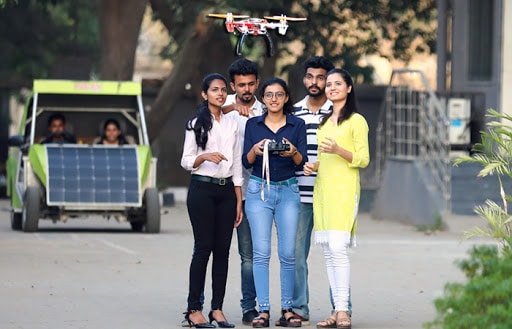Accredited with B+ Grade by NAAC Gujarati Linguistic Minority Institution DTE Code: 3460
- Home
- About us
- Academics
- Admissions
- Life @ UCoE
- IQAC
- Placements
- Examination
The Universal College of Engineering, Code of Conduct, outlines principles, policies and some of the laws that govern the activities of the college and to which our employees (faculty and staff) and others who represent the college must adhere.
The code provides guidance for professional conduct. The success and reputation of the college in satisfying its vision and mission depends on the ethical behavior, honesty, integrity and good judgment of each member of beneficiary. All employees and stakeholders of the college are expected to inform themselves about and comply with college policies and regulations pertaining to them.
The records, information and data owned, managed and used by the college must be accurate and complete. The reliability and accuracy of financial reports is having highest importance to the business operations of the college. Hence, all employees and stakeholders of the college must allocate, record and charge revenues and costs precisely and maintain supporting records as required by well-defined policies and procedures.
Employees and Students representing the college need to lever college dealing in compliance with all central, state and local laws and regulations related to their positions and responsibility. All employees and those representing the college should understand that noncompliance may have adverse financial and other consequences for them and for the college. Individuals are accountable for keeping updated with changes in relevant laws and regulations, and managers and supervisors are responsible for monitoring compliance.
The college regularly enters into contractual and other formal obligations with outside entities. These obligations may include, but are not limited to, research and other grants and contracts, software licenses, commercial contracts, gift indentures, and memoranda of understanding. All employees students representing the college are anticipated to act in good faith and stick to all obligations prescribed by the college.
The college provides computer resources, including individual computer accounts, office computers, laptops, electronic mail and remote access to administrative systems, to faculty, staff and students for their use in college. Every member is required by the college to obey with the copyright law as it applies to print, electronic materials and be proverbial with the principle of fair use.
All employees and stakeholders of college should strive to avoid the perception of conflicts of interest which might compromise their integrity and objectivity. Conflicts, including personal, financial or professional nature, have to be disclosed. Every Member should strive to eradicate or handle such conflicts in an suitable manner.
Every member including previous employees may be privy to confidential information. This information can be related to job applicants, students, employees, intellectual property, finances, research sponsors or future planning. Confidential information should be secured by safeguarding it while using and also storing it properly while not in use, and conferring with those who have a legitimate business need to know.
An employee should never liberate any confidential information without consent from heads. Inquiry regarding the release of confidential data should be directed to the department head or the Office of Human Resources.
Material violations of specified code, local laws of Central, state and regulations, or of related college procedures and policies can carry disciplinary consequences up to and including dismissal.
The college is devoted to providing a healthy and fruitful work environment for all beneficiaries.
All employees and students of the college should conduct themselves honestly, ethically and with integrity. They should proceed with due recognition of their positions of conviction and loyalty to the college and its students. In uncertainty about the propriety of a projected course of action, they should seek counsel from peers, supervisors or administrators those who can assist in determining the right and appropriate path.
The college forbids sexual or other sort of harassment or threats, whether committed by or against a student, faculty member, supervisor, colleague, vendor or visitor. Maltreatment has no place in our community, whether based on a person’s race, religion, color, creed, age, handicap, national/ethnic origin, sex, sexual orientation or disabled status.
All employees and students of the college are accountable for safeguarding the physical and intangible assets of the college under their control. College assets, including from government and donors, should not be used for personal benefit. Assets include business plans, intellectual property cash, customer information, vendor information, securities, and physical property.
The safety of people in the workplace is a prime concern of the college. The college must undertake its activities with all necessary approvals, permits and controls, in regards to the handling and disposal of hazardous and regulated materials and waste. All employees and students of the college working around or with these materials must be known with all rules, regulations and policies required.
Code of Conduct for Teachers
The Universal College of Engineering declared the following standards that apply to all registered teachers regardless of their position.
Teachers should:
Teachers should:
Teachers should:
Teachers should:
Teachers should:
Teachers should:
Code of conduct for students
Below is a list of actions that will be subject to disciplinary sanctions. The list is not all-encompassing. Being under the influence of drugs and/or alcohol will not serve as an excuse if found in violation of the Student Code of Conduct.
Near Bhajanlal Dairy & Punyadham,
Kaman Bhiwandi Road,
Vasai, Palghar – 401208
+91 800 7000 755
+91 800 7478 659
+91 840 7979 167
We welcome all aspirants to create an incredible legacy in the field of Artificial Intelligence & Machine Learning, Civil Engineering, Computer Engineering, Data Engineering, and Information Technology Engineering

